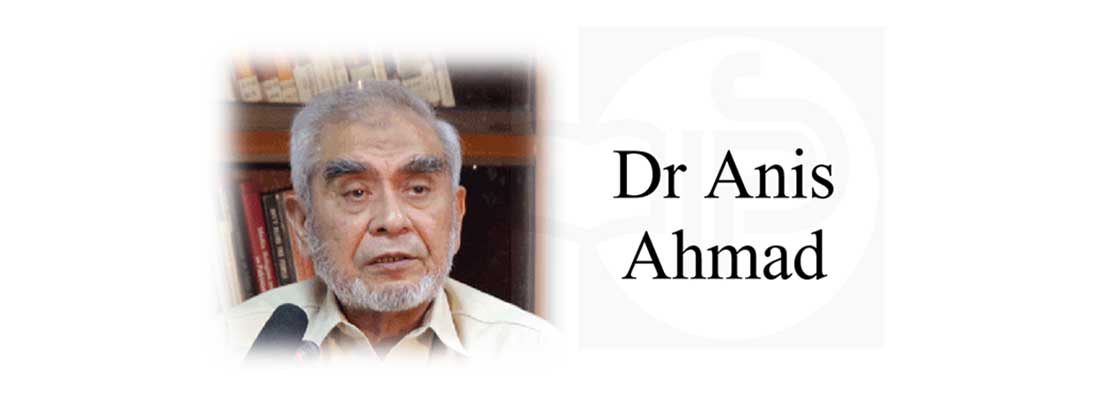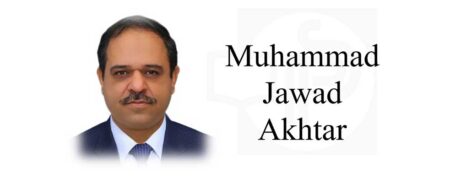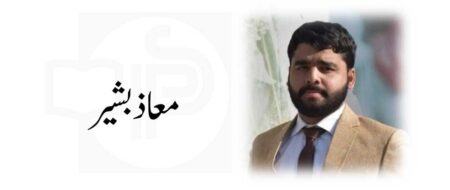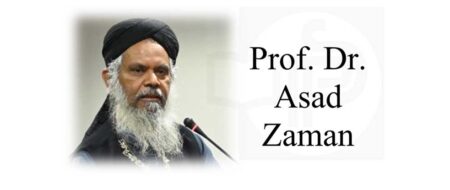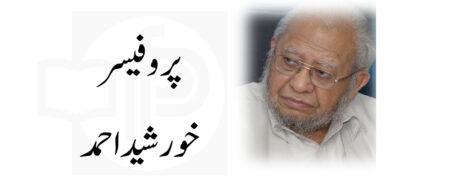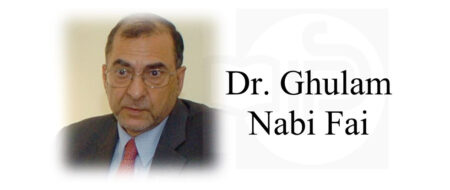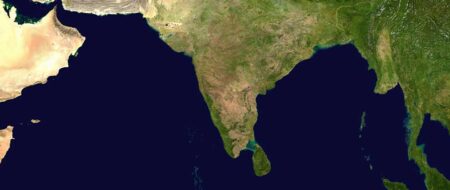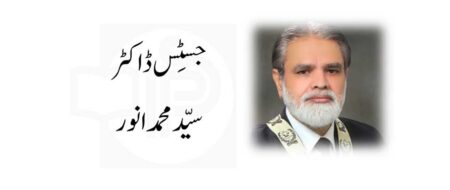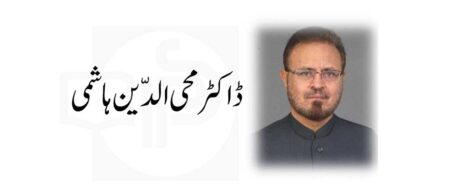Tradition, Modernity, and Muslim Epistemology
I’ll try to be brief and concentrate simply on the last part of our topic, i.e. epistemology. Epistemology means dealing with the basis of development and programming in any society. Civilization, scientific traditions, literary works, and all other aspects of human life remain subject to the worldview of the people defining them. This worldview plays a key role in shaping the concept of knowledge. I try to avoid technical terms and have always been trying to simplify things by staying away from philosophical jargon. It took me a long time to liberate myself from the charm of using cliché intellectual terminologies borrowed from French, German, and English societies. I hope you won’t mind my simple words.
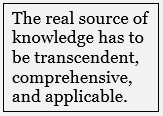 The phrase ‘theory of knowledge’ simply refers to the sources from which an individual or a society derives knowledge and how it uses or applies it. Islamic theory of knowledge is very simple; it tells us that the real source of knowledge has to be transcendent, comprehensive, and applicable. On this criteria, when we look at the concepts based on rationalism, materialism, relativism, etc. we realize that none of them can claim to be transcendent or applicable in every situation.
The phrase ‘theory of knowledge’ simply refers to the sources from which an individual or a society derives knowledge and how it uses or applies it. Islamic theory of knowledge is very simple; it tells us that the real source of knowledge has to be transcendent, comprehensive, and applicable. On this criteria, when we look at the concepts based on rationalism, materialism, relativism, etc. we realize that none of them can claim to be transcendent or applicable in every situation.
In the particular context of civilization and philosophy, epistemology is a branch of philosophy in Western classification. Quite conversely, it is a basis of philosophy in Islamic classification. Philosophy is meaningless if it is not founded on the concept of knowledge.
It has to be realized that the Persian, Turkish, Arabic, and other civilizations, cultures, and values have been studied for the last 200 years within the framework of former colonizers – the British, French, Dutch, and Spanish. These colonizers applied their ideas of ‘social constructs’ to these societies. Therefore, when they said tradition, they did not refer to native cultures; it was either British, French or another tradition alien to the host societies. For the French, it was essentially a Catholic tradition until they departed from their Catholic faith. When their Catholic, Anglican, and other approaches could not respond to modern issues, a general assumption was made that whatever values these traditions gave were obsolete, archaic, and irrelevant. Therefore, new values and definitions were needed. They deemed that the new values could be metaphysical, material, or functional. All these three values were social constructs.
The social construct, therefore, means something temporal and spatial. You cannot get out of the space and time of any of the philosophies that developed in a particular human environment. In that sense, the philosophies of Ibn Sina (980-1037 CE), Ibn Tufail Al-Andulusi (1105-1185), and even Al-Ghazali (1058-1111) are not very relevant today. Their revival will not make a difference. They were time-bound. They were based on certain concepts, and without exploring those concepts, we cannot come out with ilm an nafe` (beneficial knowledge).
Islamic epistemology means ilm an nafe` (علم النافع) and this nafa` (نفع) is defined not by its material benefits but its holistic, functional, as well as ideological validity. So, the Islamic epistemology is not a reference to Ghazali or Ibn Miskawayh (932-1030). Muslim epistemology has to be based on a transcendent basis, and none of them are transcendent.
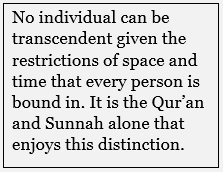 No individual can be transcendent given the restrictions of space and time that every person is bound in. It is the Qur’an and Sunnah alone that enjoys this distinction. Sunnah is not merely a tradition as we translate this word into English. In actuality, Sunnah is a form of revelation, and it is transcendent, not temporal. With this transcendent value, recourse to the Qur’an and Sunnah would develop a new breed of knowledge that will not be a mere revival of the Ummayads, Abbasids, Fatimis, Mamluks, Mughals, or Usmanians in nature. All of them were localized cultures, and none can claim transcendent Islamic modality. Therefore, when we say Islamic epistemology, it is essentially a matter of identifying its source and application.
No individual can be transcendent given the restrictions of space and time that every person is bound in. It is the Qur’an and Sunnah alone that enjoys this distinction. Sunnah is not merely a tradition as we translate this word into English. In actuality, Sunnah is a form of revelation, and it is transcendent, not temporal. With this transcendent value, recourse to the Qur’an and Sunnah would develop a new breed of knowledge that will not be a mere revival of the Ummayads, Abbasids, Fatimis, Mamluks, Mughals, or Usmanians in nature. All of them were localized cultures, and none can claim transcendent Islamic modality. Therefore, when we say Islamic epistemology, it is essentially a matter of identifying its source and application.
Lastly, the application of knowledge has to be developed on the complete understanding of a current problem. Both the West and East suffer inherent problems in their respective understanding and approach to knowledge. To add to the complexity in the East, despite a claim of orientalism, many in these regions have willingly or unwillingly transformed their thinking, language, vision, and conduct in Western ways. This Westernization might have come into these societies through Arabic, Turkish, Persian, Malay, Urdu, or any of their languages. With this polarized mind, when they think of some change, all they can assume is to do some innovative thinking in the name of ijtehad, which ultimately means a patchwork. Rather than building knowledge from the foundations, this process is mere grafting, trimming, and mending.
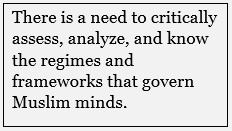 A new generation of knowledge is needed, which has to emerge only through the Qur’an and a complete understanding of modern reality, i.e. individualism, narcissism, and materialism. These three have influenced every single aspect of the life of a Muslim and non-Muslim. There is a need to critically assess, analyze, and know the regimes and frameworks that govern Muslim minds. Along with this, we should come up with some new approach that should be comprehensive, transcendent, and applicable, not hypothetical. Hypothetical discussions have always been very amusing but have little or no practical value. You can read and enjoy the academic dialogue of Ghazali and Ibn Rushd (1126-1198) about their approach to philosophy, but it does not solve the problems that you are facing today.
A new generation of knowledge is needed, which has to emerge only through the Qur’an and a complete understanding of modern reality, i.e. individualism, narcissism, and materialism. These three have influenced every single aspect of the life of a Muslim and non-Muslim. There is a need to critically assess, analyze, and know the regimes and frameworks that govern Muslim minds. Along with this, we should come up with some new approach that should be comprehensive, transcendent, and applicable, not hypothetical. Hypothetical discussions have always been very amusing but have little or no practical value. You can read and enjoy the academic dialogue of Ghazali and Ibn Rushd (1126-1198) about their approach to philosophy, but it does not solve the problems that you are facing today.
To put my assertions concisely, modern Muslim epistemology is not a mere revival or a patchwork; it is knowledge to be created, but this can only be done when a Muslim scholar has fully internalized the two sources, the Qur’an and Sunnah. Internalized means fully in blood, breathing, thinking, and vision. Then, with that approach, you try to look into the ground realities and come up with a solution to those ground realities. It ultimately means a new sociology, a new psychology, a new mathematics, and a new physics. It cannot be based on dualism, as Tawhid means to have only one personality. Islam does not bifurcate or divide human life; it only means one single unity. Unfortunately, we do not have it. The knowledge must be based on Tawhid. If the Tawhidi paradigm has to emerge, it will ensure a solution to our problems.
I am content that I can see it as a surge and a movement. I am sure it will be a new approach to life, development, social sciences, and applied sciences.
*Based on a talk held on the subject at IPS on August 1, 2023.
Prepared by Muneeba Rasikh


